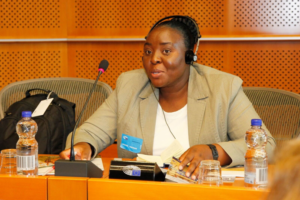University of Oxford
11a Mansfield Rd
OX1 3SZ
UK


A colleague in the field of wildlife research shared an invitation to apply for the A.G Leventis African Biodiversity Fellowship, I enquired with colleagues and family about a fellowship, and I liked the explanations. I applied for the opportunity with very high hopes and thankfully I was not disappointed. The objectives of the fellowship just aligned to what I needed to do in my career path, “a time to take a break, reflect and strategize”. Applying for the fellowship was easy, straightforward, and I got a timely response on the outcome of my application. When I received the confirmation electronic mail to confirm my participation the fellowship, I started thinking about the activities that I would do and the people that I would meet to enhance my knowledge and appreciation of academic biodiversity research outputs into action. At this point I did not imagine or think of the weather conditions during my stay in Oxford. I arrived in Oxford with a lot of enthusiasm to learn, network and share Zimbabwe’s conservation story. I braved the cold Oxford weather to go out to learn and share my biodiversity conservation journey. I attended more than 20 talks/presentations during my fellowship, and I gave several talks about my career in Zimbabwe as a Wildlife Ecologist, Chief Ecologist, and Conservation Practitioner. During these interactions I learnt that;
1. A very few people understand or appreciate sustainable use of wildlife.
2. Wildlife trade is seen as a major threat to existence of wildlife in the natural environment.
3. Wildlife trade is seen as a key driver of disease pandemics.
4. When people talk about wildlife, they just use an example of Africa and they do not recognise the different wildlife management philosophes being practiced for example in Southern and Western Africa
5. There is a lot of work being done on African species and environments that we do not know about, and decision are being made based on that information.
6. Africa is one of the continents with diverse biodiversity and as the custodians of the resources we need to learn to conserve our environments.
7. Wildlife decisions specially to do with trade are being done using emotions using data that is not so true.

Going forward I think we need to;
1. Collaborate as equal partners in research and monitoring activities.
2. There is need for education and awareness on conservation of the environment in Africa.
3. There is need for a way to enhance data and information sharing on wildlife conservation matters.
4. There is need to promote more exchange visits with African countries so that more people in developed countries appreciate wildlife management from an African perspective.
I will forever be grateful for this lifetime opportunity to be selected as one of the A.G Leventis Fellows at the University of Oxford. I appreciate the mentorship from Interdisciplinary Centre for Conservation Science (ICCS) academic research group leader Professor E.J. Milner-Gulland, and Wildlife Conservation Research Unit (WildCRU)’s Professor Andrew Loveridge. The fellowship gave me an opportunity to present the work that I do in Zimbabwe in wildlife conservation, and I also learnt a lot about the research work that is being done by academia related to biodiversity. I had several meetings, attended talks, and participated in discussion that helped improve my understanding of the global topical issues of biodiversity management, international wildlife trade, climate change, disease ecology, nature-based solutions, and nature positive challenge. I managed to connect with several people and organization who I think will be very helpful in my day-to-day work of wildlife conservation in Zimbabwe and in my continent, Africa. My network for possible future collaborations has been greatly advanced, of which I would like to thank the University of Oxford’s Department of Biology and the A. G. Leventis Foundation. This fellowship has given me a much-needed break at a point in my career where I need to reflect on my work that I have done in the past 17 years as a Wildlife Ecologist, and what I need to focus on from now into the future. One of my immediate goals is on how we can make the people of the world aware of our conservation efforts, how do we package our conservation story, how can we be heard, how can our voice be heard in a noisy world with different voices shouting at the same time, how can people co-exist with wildlife, how can we make use of wildlife acceptable in a world that is evolving to preservation, and how can I as a person contribute to reduction of my carbon footprint. I would like to thank and appreciate my employer, the Director General, and the Government of Zimbabwe for affording me a leave of absence from my work to participate fully in this fellowship, I will ensure that I will use my experience in Oxford to improve my day-to-day work and relations with my colleagues and stakeholders. I want to thank the A.G Leventis Foundation for fully funding my fellowship, I hope more people from Africa will benefit from the great initiative and help improve of biodiversity management. Finally, I would like to thank EJ and her team for the warm welcome and great working rapport that has helped me to be wiser in matters of global environment matters.

